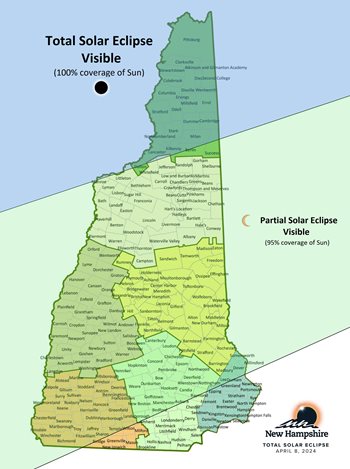
Above, check out where you can see solar eclipse in NH.
More information at: https://www.visitnh.gov/industry-members/work-together/total-solar-eclipse
By PAULA TRACY, InDepthNH.org
CONCORD – With the solar eclipse coming in just 19 days, and Northern New Hampshire in its path of totality, many are scrambling to find proper eyewear for the event.
The American Astronomical Society said that with just several weeks to go until the April 8th North American total solar eclipse, consumer interest in eclipse glasses and other solar viewers is beginning to spike. It is time now, they said to get your glasses.
In New Hampshire, from museums to libraries to retail and optical shops, the availability of the glasses is dwindling but there are many online options.
While the AAS said some sellers are making misleading claims about their products they have seen no evidence that any of the eclipse glasses or other solar viewers being sold for use on April 8th are unsafe.
The prices of the glasses range from $2 to more than $16 a pair and range from cardboard to plastic.
The event is going to occur whether or not its cloudy, after 2 p.m. on that Monday.
Just before and after the moon completely obscures the sun’s bright face –– which will occur only within a narrow path that crosses Mexico, sweeps from Texas to New Hampshire and Maine, and traverses parts of eastern Canada, the sun is dangerously bright and must be viewed only through special-purpose safe solar filters, the AAS said.
Normal sunglasses will not cut it.
Safe solar viewers are those that block all but a minuscule fraction of the Sun’s ultraviolet, visible, and infrared light.
Overexposure to sunlight in these parts of the spectrum can cause severe eye injury, ranging from temporarily impaired vision to permanent blindness.
“Solar filters that provide safe, comfortable, unmagnified views of the Sun generally transmit between 1 part in 100,000 (0.001%) and 1 part in 2,000,000 (0.00005%) of its visible light,” says Rick Fienberg, Project Manager of the AAS Solar Eclipse Task Force and a veteran of 14 total solar eclipses. “Such filters are at least 1,000 times darker than even the darkest sunglasses.”
While locations to buy the glasses in the state are decreasing due to demand, some libraries, optical shops, and retailers like Best Buy, Toys R Us and even convenience stores are places to look.
There are also online options including Amazon where you can buy a 10-pack for $14.95.
For school children, the state has an opportunity to get the glasses at comms@doe.nh.gov.
To know the glasses are safe look for the ISO 12312-2 standard. Solar viewers that comply with the transmittance requirements of ISO 12312-2 are safe, the AAS said.
To help the public obtain properly documented, vetted viewers, the AAS Solar Eclipse Task Force has compiled a list of vendors of safe solar viewers at https://eclipse.aas.org/eye-safety/viewers-filters.
“For every seller on the list, we’ve confirmed three things: (1) the identity of the manufacturer, (2) that the manufacturer’s viewers have been tested for compliance with the ISO 12312-2 standard by a lab properly accredited to do so, and (3) that the viewers meet the standard’s transmittance requirements across the parts of the spectrum to which our eyes are at risk from overly bright light,” the association’s press release states.
The American Astronomical Society, established in 1899, is a major international organization of professional astronomers, astronomy educators, and amateur astronomers.
Its membership of approximately 8,000 also includes physicists, geologists, engineers, and others whose interests lie within the broad spectrum of subjects now comprising the astronomical sciences. The mission of the AAS is to enhance and share humanity’s scientific understanding of the universe as a diverse and inclusive astronomical community, which it achieves through publishing, meetings, science advocacy, education and outreach, and training and professional development.
In New Hampshire, the state has a webpage https://www.visitnh.gov/solareclipse listing at least 21 events from Stewartstown to Nashua including a series of events offered by the Mount Washington Observatory and there are also listings within those events where people can get glasses, including the SEE Science Center in Manchester where there will be a partial eclipse viewing in Arm’s Park from 2 to 4:30 p.m. April 8.
The website also lists packages available for travelers which include lodging and glasses ranging from the Appalachian Mountain Club’s lodges in Pinkham and Crawford Notch and at the Omni Mount Washington Resort where a ballroom event April 7 will feature Dr. Neil Comins, professor of physics will lead a discussion on the solar system.
Gov. Chris Sununu has said that the state is excited and preparing to welcome visitors for what could be “a truly stellar day.”
Paula Tracy is InDepthNH.org’s senior writer and has 30 years experience as a reporter.





